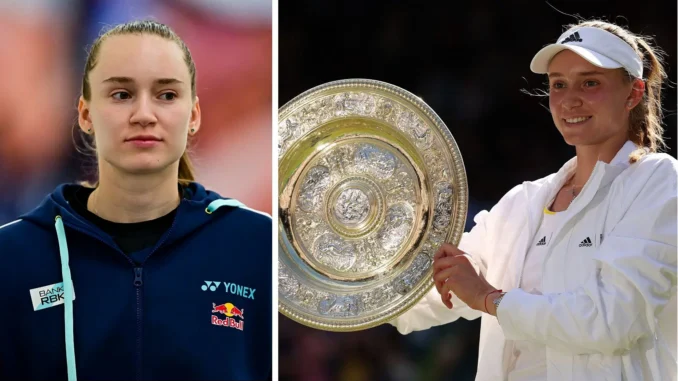
As the clay season of 2025 begins to paint the tennis courts red, Elena Rybakina, Kazakhstan’s towering tennis star, is opening up about a deeply personal chapter of her remarkable career—one that unfolded just days before her historic Wimbledon triumph in 2022. The 25-year-old, who has since risen to world No. 4 and boasts eight WTA titles, including that unforgettable Grand Slam victory, recently shared a candid reflection on the self-doubt that nearly derailed her path to glory. With her powerful serve and unflappable demeanor, Rybakina has become a force on the tour, but her revelation peels back the curtain on the mental battles she fought en route to lifting the Venus Rosewater Dish, offering fans a rare glimpse into the psyche of a champion.
Picture the scene: June 2022, the grass courts of Wimbledon shimmering under the English sun, and Rybakina, then ranked No. 23, preparing for what would become the defining moment of her career. She’d arrived at the All England Club with little fanfare, her grass season off to a shaky start after early exits in ‘s-Hertogenbosch and Eastbourne. “I had been on the road a long time and so I had not many expectations going there,” she recalled, her voice tinged with the memory of uncertainty. Injuries had nagged at her, and her form felt elusive. In her mind, the second week of the tournament seemed more like a vacation fantasy than a realistic goal. “I was actually thinking I would be on holiday,” she admitted, a confession that underscores the vulnerability lurking beneath her stoic exterior.
Yet, what unfolded over those two weeks was nothing short of extraordinary. Rybakina embarked on a run that defied her own expectations, toppling formidable opponents like Bianca Andreescu, Simona Halep, and, in the final, Ons Jabeur. The championship match—a gripping 3-6, 6-2, 6-2 comeback—crowned her the first Kazakhstani to win a Grand Slam singles title, a feat made all the more poignant by the ban on Russian and Belarusian players that year, which her switch to Kazakhstan in 2018 had allowed her to sidestep. But behind the scenes, the days leading up to that triumph were a storm of self-doubt. “It was not easy to overcome this win because, of course after winning a title, you are like, ‘Wow, I hope it was not just by mistake, or by luck or whatever it is,’” she shared, revealing the weight of proving that her success was no fluke.
Rybakina’s journey to that moment had been a winding one. Born in Moscow, she’d once been a promising junior, reaching No. 3 in the world, but financial hurdles nearly pushed her toward college in the U.S. instead of the pro circuit. The Kazakhstan Tennis Federation’s support changed her trajectory, and by 2019, she was breaking into the top 100 with her first WTA title in Bucharest. Wimbledon 2022, though, was the pinnacle—a breakthrough that thrust her into the spotlight and onto a stage she hadn’t fully anticipated. “I had ups and downs during last season and before Wimbledon my tournaments weren’t successful,” she explained, painting a picture of a player wrestling with confidence as the grass season loomed.
What makes her story so compelling is how she turned that doubt into determination. Each match at Wimbledon became a stepping stone, a chance to silence the inner critic that questioned her readiness. Her semifinal demolition of Halep, a former champion, was a turning point, and by the time she faced Jabeur, she’d found her rhythm. “We stay in a bigger house this time because my team is bigger this year,” she noted ahead of her 2023 title defense, a subtle nod to the growth that followed her victory. That win didn’t just reshape her career—it reshaped her. The lack of ranking points due to the WTA’s response to Wimbledon’s player ban meant she didn’t immediately climb into the top 10 as expected, a frustration she’s since channeled into a stellar 2023, with titles in Indian Wells and Rome, and a runner-up finish at the Australian Open.
Now, as she prepares for the clay swing—starting with the Billie Jean King Cup qualifiers in Australia—Rybakina carries the lessons of that Wimbledon run with her. Her revelation about self-doubt isn’t a tale of weakness, but of resilience. “It’s a lot of expectations from you and a lot of people looking at you, waiting that what you are gonna do next,” she said, acknowledging the pressure that followed. Yet, it’s her ability to rise above it—to transform uncertainty into a historic triumph—that defines her. For a player once unsure she’d survive the first week, Rybakina’s Wimbledon win stands as a testament to the power of belief, even when it wavers, and a reminder that even champions wrestle with their own shadows before stepping into the light.
Leave a Reply